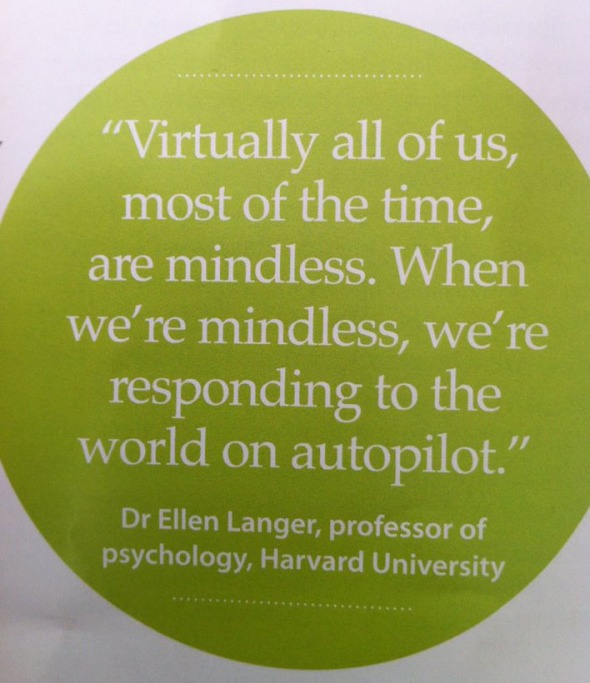Positive Thinking Vs Mindfulness
Posted: February 10, 2012 Filed under: Uncategorized | Tags: Dr Russ Harris, mindful, mindfulness, positive thinking Leave a commentPositive thinking is not a new concept, but in recent times it has become an increasingly popular tool for achieving good health, happiness and success. There seems to be a consensus on the value of consciously cultivating positive thinking for individual growth.
The Oxford English Dictionary defines optimism as having “hopefulness and confidence about the future or successful outcome of something; a tendency to take a favourable or hopeful view.”
But is it enough to actually yield positive results?
Now I must admit I am a culprit of many a time lecturing myself or even my loved ones that, “negative thoughts attract negativity in life”. However is that true, or can thinking this way during challenging times, instead burden us further with the notion that we have ultimately created these events for ourselves through our negative thoughts?
Of late I have come to look at positive thinking in a different light. Even though I am all for being positive, I have come to understand that it is not only about thinking positive thoughts but it’s about how you feel about yourself. Your inner dialogue or better yet your inner critic, that no one else sees or hears.
When you hear or read about positive affirmations and visualisation techniques, it suggests you have to believe that it (your goal or desire) has already happened! But when you have that little voice inside your head that says “ yeah visualize all you want but it’ll never happen cause you’re just not good enough/you don’t deserve it”, may explain why sometimes those positive things just don’t come to you so easily.

So you ask, how do you get to the point where you no longer have those negative thoughts, where you can shut that inner critic up once and for all? The way I see it is, you can’t.
What you can do is become aware of that voice, those thoughts, that critic and learn how to recognize it and only give value to the positive thoughts that will benefit you.
Allow yourself to feel negative in that moment without judgment, connect with that thought, and then ask yourself “ If I let this thought guide me, is it beneficial to me?” If it is not, you allow the thought to flow though you, and release it. Develop a space between your thoughts and actions. With time, you will come to identify the thoughts or beliefs that hook you into negative patterns and behaviours.
Dr Russ Harris, author of “The Happiness Trap” and “The Reality Slap” describes this as “Mindfulness: a mental state of awareness, focus and openness – which allows you to engage fully in what you are doing at any moment. In a state of mindfulness, difficult thoughts and feelings have much less impact and influence over you.”

Dr Harris suggests to help develop mindfulness you must practice Anchoring yourself. Imagine you are a boat out at sea during a storm; you are being tossed around and washed away until you throw in your anchor. The storm is still going on around you but now you are stable, in that one spot with your anchor grounding you.
A popular way to anchor yourself is through meditation. But as meditation isn’t for everyone, Dr Harris suggests the following technique you can use in your everyday life to help with this practice.
Anchor yourself in the present moment: Look around you and notice 5 things you can see, then notice 5 things you can hear, then smell etc. Engage completely with yourself in that moment.
You can do this:
· In the shower every morning. Become mindful and totally engaged with the water hitting your skin, the smell of the soap. You may get hooked and pulled back into thoughts about what your day will look like etc but just bring yourself back into the moment.
· Turn a chore into mindful practice. Something you would normally do with distraction- ironing clothes in front of TV etc.
· During pleasant tasks like having a cup of tea- Switch off the autopilot and be in the moment, enjoy the flavour and smell: engage your 5 senses.
The more you practice the better you get. And with time, these same techniques will carry over into other life situations, both positive and negative, allowing your thoughts to become a background noise, like having the radio on while you work.
As Stephen Hayes simply put it “There is as much living in a moment of pain as in a moment of joy”
I know I would rather experience real emotion, be it good or bad, than bottle it up and fight against it. What about you?